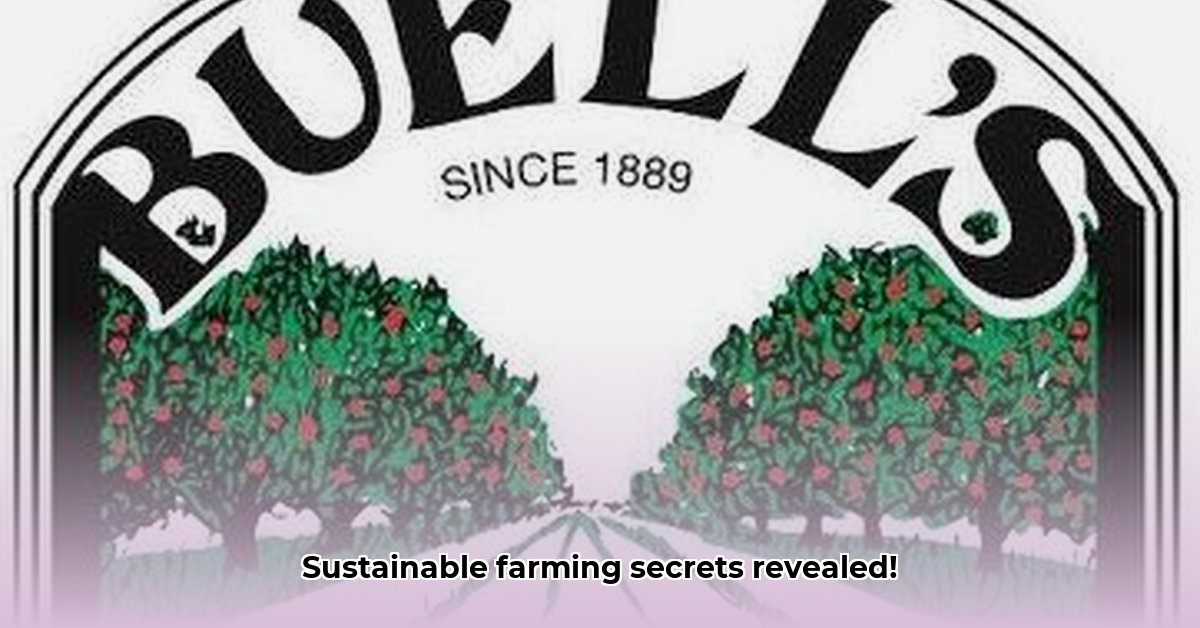
Buell's Orchard CT: A Century of Sustainable Success
Buell's Orchard, a Connecticut institution since 1889, isn't just about delicious apples; it’s a living testament to sustainable farming and family legacy. From springtime strawberries to autumn's crisp apples, this orchard offers a vibrant seasonal bounty. But its enduring success stems from more than just fertile soil – it's a story of adaptation, community, and a deep-rooted commitment to sustainable practices. This case study explores Buell's journey, highlighting its successes, challenges, and offering actionable insights for other farms striving for long-term sustainability and profitability.
Did you know that Buell's Orchard has been family-run for over 130 years? That kind of longevity speaks volumes about their dedication and adaptability.
A Family's Enduring Commitment to the Land
For over 130 years, the Buell family has nurtured this land, passing down not only farming techniques but a profound respect for the environment and the community. Each generation has built upon the previous one's work, creating a legacy deeply intertwined with the orchard's success. This isn't simply a business; it's a family's enduring love affair with the soil.
Sustainable Practices: A Deep-Rooted Philosophy
While precise data on specific sustainable practices at Buell's Orchard isn’t readily available for this case study, the farm’s commitment to environmental stewardship is evident. Their crop diversification strategy—cultivating a wide range of fruits and vegetables—demonstrates a sophisticated understanding of ecological balance and risk mitigation. This approach significantly reduces vulnerability to single-crop failures, ensuring a more reliable harvest despite seasonal variations. This holistic approach exemplifies the farm's commitment to environmental responsibility.
How does crop diversification impact their overall yield and profitability? Further research could quantify these benefits.
Navigating the Challenges: Innovation as a Catalyst
Farming presents consistent challenges: unpredictable weather, fluctuating market prices, and labor management. However, Buell's Orchard views these as opportunities for innovation. They consistently analyze data, track resources, and refine operations for maximum efficiency and resilience.
For instance, one short-term goal might be optimizing labor allocation during peak harvest seasons using scheduling software. Long-term, investing in infrastructure—such as improved cold storage or efficient irrigation systems—could dramatically enhance sustainability and profitability.
What innovative technologies could further enhance Buell's operational efficiency and reduce environmental impact?
Cultivating Community: More Than Just an Orchard
Buell's Orchard is deeply woven into the fabric of its community. Annual events like the Harvest Festival and Trunk or Treat transform the orchard into a vibrant social hub. This community engagement is not merely a public relations strategy; it's a foundational element of their business model, fostering customer loyalty and strengthening their local connections. This active community involvement has proven to be a significant factor in their long-term sustainability.
How does community engagement directly translate into increased sales and customer retention for Buell's Orchard? Further qualitative research could explore this link more thoroughly.
A Roadmap for Continued Success: Actionable Steps
To ensure long-term prosperity, Buell's Orchard should prioritize the following strategies:
Enhanced Record-Keeping: Implement robust record-keeping systems to track expenses, yields, and sales data for informed decision-making. (This could involve using farm management software.)
Data-Driven Labor Allocation: Optimize labor allocation during peak seasons with scheduling and task management software. This would lead to a more efficient use of workforce.
Product Diversification: Expand product offerings beyond fresh produce into value-added products like jams, ciders, or baked goods, extending the seasonality of income generation.
Infrastructure Improvements: Targeted investments in infrastructure – improved storage, irrigation systems, possibly even renewable energy solutions.
Conclusion: A Legacy of Sustainable Success
Buell's Orchard serves as an inspiring example of sustainable agricultural practices and community engagement. Their generational success stems from a combination of factors: a deep-rooted family legacy, a commitment to environmental stewardship, community engagement, and a willingness to adapt to the challenges of modern agriculture. By continuing to prioritize these key elements, Buell's Orchard is poised for continued prosperity and to serve as a model for other sustainable farms for years to come. Their story underscores the vital connection between environmental responsibility, community engagement, and long-term economic success in sustainable agriculture.